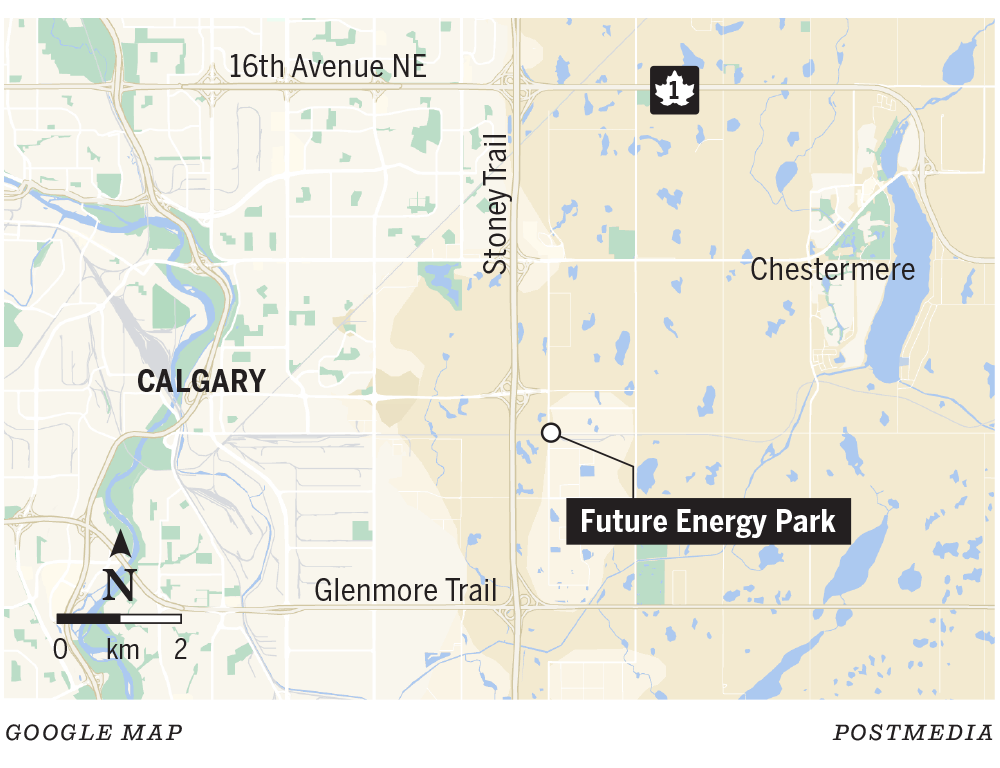With the Alberta government’s stamp of approval, a $1.2-billion negative-emissions biofuels plant on southeast Calgary’s edge is officially allowed to begin construction.
And while the project has flown relatively under the radar and comes with high up-front costs, one expert says various Canadian regulations targeting emissions will help make it economically viable.
The project, slated to open in 2026, is expected to approximately triple the amount of renewable natural gas (RNG) on Canada’s grid, though still making up less than a per cent of all natural gas production.
Future Energy Park will use non-food grade waste to produce RNG that’s fed directly into a nearby natural gas mainline. It will also produce ethanol and methane-reducing cattle feed.
“It’s ready to get built and certainly has a massive impact on the local economy and the local supply chain,” Jesse Douglas, CEO of Green Impact Partners, a publicly traded clean energy company, said in an interview with Postmedia.
The project has been largely privately funded.
GIP announced Monday it had received approval from Alberta’s Ministry of Environment and Protected Areas, the final regulatory hurdle it’s needed to clear over the past two years.
The 21-hectare property is expected to create 800 jobs over two years of construction and about 100 jobs during operations. It’s also expected to add $50 million annually to city coffers and provide $150 million in yearly revenue to rural wheat producers.

Biofuel plants post remarkably low emissions by creating energy from waste products such as manure and wastewater. They trap gases including methane and carbon dioxide, which can be processed into natural gas or used as fuel for heating, electricity and transportation.
By trapping those gases that would otherwise be released, GIP says the Future Energy Park will be North America’s largest carbon-negative biofuels facility. Douglas said its carbon intensity score will be negative-20.
“By putting (waste products) into a process where those emissions no longer escaping into the atmosphere, we are removing those methane emissions that would otherwise end up there,” he said.
Methane emissions, which are more than 80 per cent more potent than carbon dioxide during its 20-year life, are required to drop 75 per cent below 2012 levels by 2030 if draft regulations released last week are cemented.
Industrial-sector carbon tax makes biofuel facilities viable: expert
Biofuel plants are also expensive to build — and the cost of producing RNG is significantly higher than normal methods. Producing natural gas costs about $3 to $4 per Metric Million British thermal units (MMBtu), whereas it’s around $30 per MMBtu for RNG.
But projects like Future Energy Park are made viable through emissions-reduction regulations such as Canada’s Clean Fuel Standards or the industrial carbon tax, said Bernie Roth, partner at Dentons Canada LLP, with a focus on energy regulation.
“At the end of the day, most of this activity is being supported by government policy,” he said.
Roth said biofuel plants need certainty the cost of carbon will continue to rise — large emitters in Alberta currently pay $65 per tonne of CO2 and will hit $170/tonne by 2030 — because it encourages industry to transition to cleaner energy sources.
The Clean Fuel Regulations meanwhile require producers to reduce the carbon intensity of the gasoline and diesel sold in Canada, which can be achieved by blending it with the ethanol produced at biofuel plants.
But there can be significant downside if the government injects uncertainty into emissions regulations, Roth said.
“If there’s no certainty of that carbon costs, then the economics of a lot of these plants are challenged,” Roth said.
So while biofuels are more expensive to create, Douglas said the company’s biofuels could save companies and consumers from the damage $170/tonne will inflict.
“If somebody was to pay the premium that we would sell at the current price for RNG, they would actually be saving the consumer money at the end of the day,” he said.
-
 Billion-dollar bioethanol plant proposed for S.E. Calgary
Billion-dollar bioethanol plant proposed for S.E. Calgary -
 Calgary biofuel company gets $1.4M in federal funding
Calgary biofuel company gets $1.4M in federal funding -
 Alberta invests $4.7 million into facility aimed at turning farm waste into fuel
Alberta invests $4.7 million into facility aimed at turning farm waste into fuel -
 Imperial Oil greenlights $720 million to build largest renewable diesel plant in Canada
Imperial Oil greenlights $720 million to build largest renewable diesel plant in Canada
You can read more of the news on source




